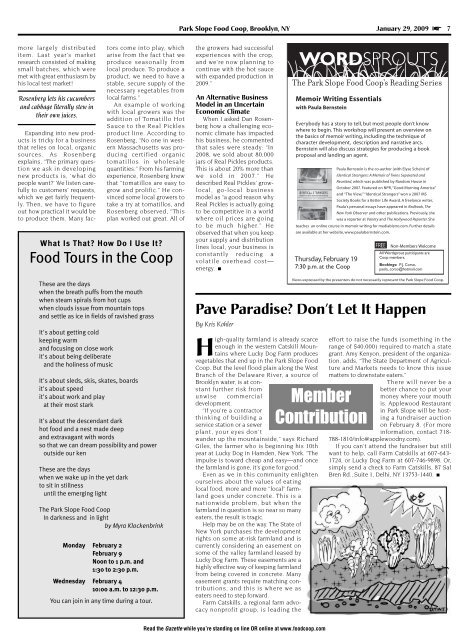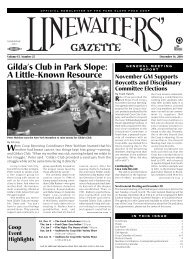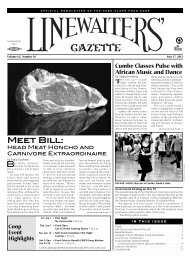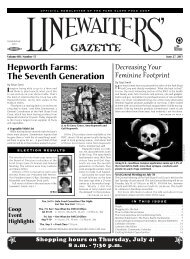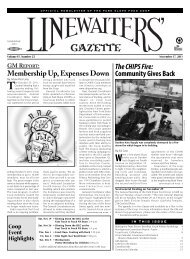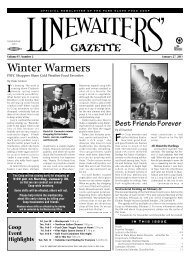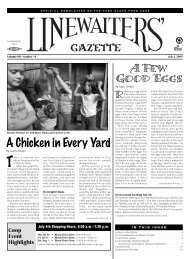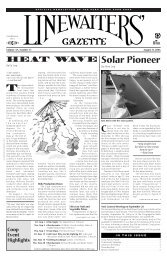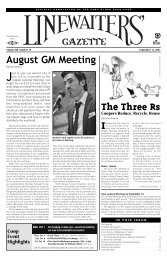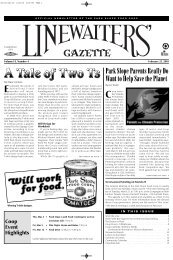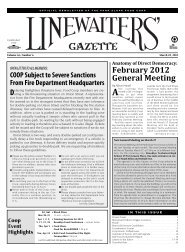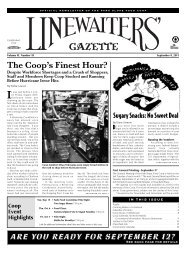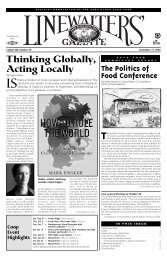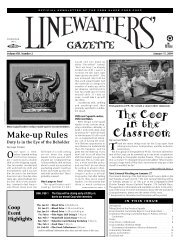Real Pickles: More Than Just a Pickle - Park Slope Food Coop
Real Pickles: More Than Just a Pickle - Park Slope Food Coop
Real Pickles: More Than Just a Pickle - Park Slope Food Coop
- No tags were found...
Create successful ePaper yourself
Turn your PDF publications into a flip-book with our unique Google optimized e-Paper software.
09-01-29 p1-16 2/18/09 5:20 PM Page 7<strong>Park</strong> <strong>Slope</strong> <strong>Food</strong> <strong>Coop</strong>, Brooklyn, NY January 29, 2009 7more largely distributeditem. Last year’s marketresearch consisted of makingsmall batches, which weremet with great enthusiasm byhis local test market!Rosenberg lets his cucumbersand cabbage literally stew intheir own juices.Expanding into new productsis tricky for a businessthat relies on local, organicsources. As Rosenbergexplains, “The primary questionwe ask in developingnew products is, ‘what dopeople want?’ We listen carefullyto customers’ requests,which we get fairly frequently.Then, we have to figureout how practical it would beto produce them. Many factorscome into play, whicharise from the fact that weproduce seasonally fromlocal produce. To produce aproduct, we need to have astable, secure supply of thenecessary vegetables fromlocal farms.”An example of workingwith local growers was theaddition of Tomatillo HotSauce to the <strong>Real</strong> <strong><strong>Pickle</strong>s</strong>product line. According toRosenberg, “No one in westernMassachusetts was producingcertified organictomatillos in wholesalequantities.” From his farmingexperience, Rosenberg knewthat “tomatillos are easy togrow and prolific.” He convincedsome local growers totake a try at tomatillos, andRosenberg observed, “Thisplan worked out great. All ofWhat Is That? How Do I Use It?<strong>Food</strong> Tours in the <strong>Coop</strong>These are the dayswhen the breath puffs from the mouthwhen steam spirals from hot cupswhen clouds issue from mountain topsand settle as ice in fields of ravished grassIt's about getting coldkeeping warmand focusing on close workit's about being deliberateand the holiness of musicIt's about sleds, skis, skates, boardsit's about speedit's about work and playat their most starkIt's about the descendant darkhot food and a nest made deepand extravagant with wordsso that we can dream possibility and poweroutside our kenThese are the dayswhen we wake up in the yet darkto sit in stillnessuntil the emerging lightThe <strong>Park</strong> <strong>Slope</strong> <strong>Food</strong> <strong>Coop</strong>In darkness and in lightby Myra KlockenbrinkMonday February 2February 9Noon to 1 p.m. and1:30 to 2:30 p.m.Wednesday February 410:00 a.m. to 12:30 p.m.You can join in any time during a tour.the growers had successfulexperiences with the crop,and we’re now planning tocontinue with the hot saucewith expanded production in2009.”An Alternative BusinessModel in an UncertainEconomic ClimateWhen I asked Dan Rosenberghow a challenging economicclimate has impactedhis business, he commentedthat sales were steady: “In2008, we sold about 80,000jars of <strong>Real</strong> <strong><strong>Pickle</strong>s</strong> products.This is about 20% more thanwe sold in 2007.” Hedescribed <strong>Real</strong> <strong><strong>Pickle</strong>s</strong>’ growlocal,go-local businessmodel as “a good reason why<strong>Real</strong> <strong><strong>Pickle</strong>s</strong> is actually goingto be competitive in a worldwhere oil prices are goingto be much higher.” Heobserved that when you keepyour supply and distributionlines local, your business isconstantly reducing avolatile overhead cost—energy. ■Pave Paradise? Don’t Let It HappenBy Kris KohlerHigh-quality farmland is already scarceenough in the western Catskill Mountainswhere Lucky Dog Farm producesvegetables that end up in the <strong>Park</strong> <strong>Slope</strong> <strong>Food</strong><strong>Coop</strong>. But the level flood plain along the WestBranch of the Delaware River, a source ofBrooklyn water, is at constantfurther risk fromunwise commercialdevelopment.“If you’re a contractorthinking of building aservice station or a sewerplant, your eyes don’twander up the mountainside,” says RichardGiles, the farmer who is beginning his 10thyear at Lucky Dog in Hamden, New York. “Theimpulse is toward cheap and easy—and oncethe farmland is gone, it’s gone for good.”Even as we in this community enlightenourselves about the values of eatinglocal food, more and more “local” farmlandgoes under concrete. This is anationwide problem, but when thefarmland in question is so near so manyeaters, the result is tragic.Help may be on the way. The State ofNew York purchases the developmentrights on some at-risk farmland and iscurrently considering an easement onsome of the valley farmland leased byLucky Dog Farm. These easements are ahighly effective way of keeping farmlandfrom being covered in concrete. Manyeasement grants require matching contributions,and this is where we aseaters need to step forward.Farm Catskills, a regional farm advocacynonprofit group, is leading theMemberContributioneffort to raise the funds (something in therange of $40,000) required to match a stategrant. Amy Kenyon, president of the organization,adds, “The State Department of Agricultureand Markets needs to know this issuematters to downstate eaters.”There will never be abetter chance to put yourmoney where your mouthis. Applewood Restaurantin <strong>Park</strong> <strong>Slope</strong> will be hostinga fundraiser auctionon February 8. (For moreinformation, contact 718-788-1810/info@applewoodny.com).If you can’t attend the fundraiser but stillwant to help, call Farm Catskills at 607-643-1724, or Lucky Dog Farm at 607-746-9898. Or,simply send a check to Farm Catskills, 87 SalBren Rd., Suite 1, Delhi, NY 13753-1440. ■Read the Gazette while you’re standing on line OR online at www.foodcoop.com


